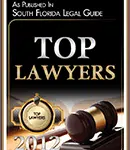Few in America had even heard of the term "Stand Your Ground" before George Zimmerman was arrested on April 11, 2012 and subsequently tried and acquitted earlier this year. However, ever since the acquittal, it has caused a lightning rod of controversy in public circles, network news and in social media. Celebrities have threatened a boycott of our great state as a result of having this law, notwithstanding the fact that Florida is one of twenty six (26) states that have some form of a Stand Your Ground Law.
However, most who argue it’s constitutionality often do so without truly understanding what it means, atleast in the State of Florida. So here it goes:
Florida Statute 776.032 stands for the proposition that a person has the right to use force to defend themself and is immune from criminal prosecution and civil suit for the use of such force.
Most people, including but not limited to those who followed the George Zimmerman case, regardless of whether you agreed with the outcome do not understand that there is a difference between Stand Your Ground and Self Defense.
Stand Your ground is a legal question to be considered by the judge, whereas self defense is a factual question to be determined by a jury based on evidence presented in a trial. The latter was the case of George Zimmerman.
So is Stand Your Ground Good or Evil? Well, there are two sides to this. There are those who in their life have been in a position where they felt the need to defend themself against the act(s) of another and there are those who have never been in such a position. The former would easily argue that it is a good/necessary law and the latter would argue that it is evil.
Stand Your Ground is a law that will not be going away and our attorneys at Hager & Schwartz, P.A. will continue to utilize such for those who fear for their safety by the actions of others and feel the necessity to act to protect themself.
Our attorneys have experience handling Stand Your Ground and Self Defense Cases with clients accused of crimes including but not limited to Domestic Battery, Aggravated Battery, Simple Battery and Attempted Homicide cases.




